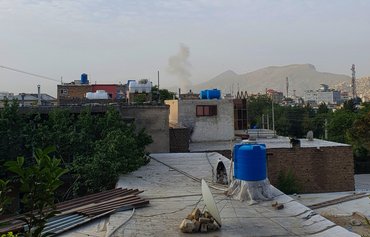The recent death of al-Qaeda leader Ahmad Hassan Abu al-Khair al-Masri, said to be the group's second in command, has dealt the terror group a heavy blow that will have widespread repercussions, experts and military officials tell Diyaruna.
Al-Masri was killed in a coalition airstrike that targeted his car near the town of al-Mastuma in Syria's Idlib province, the Syrian Observatory for Human Rights reported on February 26th.
Al-Qaeda in the Arabian Peninsula (AQAP) and al-Qaeda in the Islamic Maghreb (AQIM) issued a joint statement confirming his death.
Al-Masri, 59, whose real name is Abdullah Mohamed Rajab Abdel-Rahman, hailed from northern Egypt and is said to have been the son-in-law of al-Qaeda founder Osama bin Laden.
"This blow is one of the heaviest al-Qaeda has suffered this year," said terror group specialist Maj. Gen. Yahya Mohammed Ali, who is retired from the Egyptian army.
Though he kept a low profile, al-Masri must have played a key role in the recent regrouping of al-Qaeda-linked groups in Syria, he told Diyaruna.
Al-Qaeda's Syrian affiliate al-Nusra Front (ANF) changed its name to Fatah al-Sham Front and on January 28th announced it was merging into the newly formed Tahrir al-Sham alliance .
In addition to ANF, the new alliance includes four major opposition factions – Nureddin al-Zinki, Liwa al-Haq, Ansar al-Din Front and Jaish al-Sunna – dozens of smaller factions and a large number of Ahrar al-Sham elements and officials.
Divisions began to emerge with the creation of this new group, Ali said, with many elements refusing to fight under the banner of the new entity.
Al-Masri's death "will increase the divisions between these elements, making it easier to pick them off separately in the ongoing military operations", Ali said.
Additionally, he said, targeting first-tier al-Qaeda leaders such as al-Masri "will undoubtedly rattle the group and throw its leadership structure into disarray".
Al-Qaeda is losing leaders
Al-Masri's death is a "huge blow to al-Qaeda", said Sheikh Nabil Naim, a founding member of Islamic Jihad in Egypt who has since renounced extremist ideology.
The group has lost most of its first-tier leaders in Syria and Iraq, he told Diyaruna, noting that al-Masri had been one of the planners of external operations and global terrorist attacks.
Based on the group's chain of command, the loss of al-Masri will weaken many subsidiary networks who took orders directly from him, Naim said.
"This will undoubtedly weaken al-Qaeda in Syria and degrade the capabilities of some of the elements who fled Iraq," he said.
Due to his roots in Egypt, al-Masri also claimed influence over a number of Egyptian extremists, he said, as well as those elsewhere in the Arab world.
These include the followers of Hilmi Hashem, a key architect of the extremist ideology of the "Islamic State of Iraq and the Levant" (ISIL), an al-Qaeda splinter group, he said. Hashem was a prominent leader of al-Shawqiyeen group in Egypt, which recruited many youth and sent them to fight in Syria and Iraq.
They also include Egyptian al-Qaeda leader Abd al-Aziz al-Jamal and his followers, "all of whom take orders from [founding al-Qaeda member] Abdullah [Yusuf] Azzam’s son [Huthaifa Azzam], especially those who had fought in Afghanistan and returned to fight in Iraq and Syria", Naim said.
As a consequence of al-Masri's death, he said, prevailing upon these groups to work under the banner of al-Qaeda will meet with "many obstacles due to the many disputes and disagreements that exist between these elements ".
This is especially the case in regard to who assumes command and leadership, he said.
Naim said he expects the remnants of al-Qaeda in Syria will not endure for long, as its members "are mere mercenaries who travel to areas where well-funded groups have a presence to work with them and derive maximum financial benefit".
"The successive elimination of Egyptian leaders also will impact the recruitment of Egyptians and Arabs and sap the strength of those who remain in Syria," said Middle East Centre for Regional and Strategic Studies researcher Fathi al-Sayyed.
In addition to killing al-Masri, he told Diyaruna, the coalition has killed Sheikh Hani Haikal, also known as Abu Hani al-Masri; Ahmed Salama Mabrouk or "Abu Salama al-Masri", and an extremist known as Abu al-Afghan al-Masri.

![An international coalition airstrike targeted the car of senior al-Qaeda leader Ahmad Hassan Abu al-Khair al-Masri in the town of al-Mastuma in northern Syria. [Photo circulating on al-Qaeda supporters' social media accounts]](/cnmi_di/images/2017/03/20/7427-Syria-AQ-leader-600_384.jpg)






